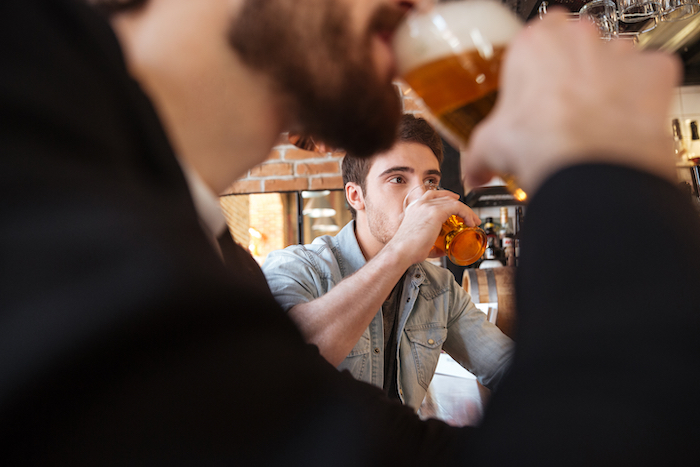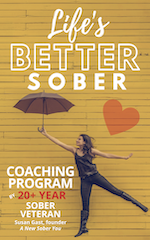Am I A Drunk: 7 Questions To Ask Yourself
It’s 10 a.m. Am I a drunk? I wonder. I crack open one eye, and the light through the partially opened window blind stabs my eyeball, adding more pain to the headache that’s pounding away in my forehead.
I try to throw the blankets back, but my body feels like it’s made of lead. Weak, tired, and drained, I force myself to sit up, throw my legs over the side of the bed—and the spinning starts. Nausea swirls in my stomach, and my tongue feels like sandpaper. I close my eyes again, hoping the dizziness will pass.
The only thing I’m grateful for right now is that it’s Sunday and I don’t have to go to work. But what a waste of a beautiful Sunday. I already know how this day will go: dragging myself around the house, exhausted, hungover, craving greasy food, and promising myself, once again, that I’ll quit drinking.
I make that promise a lot.
Promises Made, Not Kept
will I wake up feeling like this. Never again will I put myself through another day of regret.
But then, a couple of hours later, the shakes kick in. My anxiety starts rising like a tide I can’t hold back. I reach for a beer—not because I want to, but because I know it will make me feel better. I pop the can open, sneer at the stench of it, but I drink anyway. I tell myself it’s just one beer, just to take the edge off.
It’s never just one.
Six beers later, I’m joking with my friends online, saying stupid stuff I’ll regret, convincing myself that I’ll quit tomorrow.
But tomorrow never comes.
— Claire A.
This was Claire’s reality for years. Over and over, she found herself trapped in an addiction cycle she couldn’t break. She knew she needed to stop drinking, but the pull of habit, the fear of withdrawal, and the deep-rooted belief that she couldn’t function without alcohol kept her stuck. Like so many others, she needed more than just the thought of quitting—she needed a reason to quit.
It was time for her to ask herself some hard questions.
The 7 All-Important Questions
If you’ve ever found yourself wondering, am I a drunk? you’re not alone. Problem drinking doesn’t happen overnight—it sneaks up, slowly but surely, until one day, you realize alcohol has more control over you than you have over it. That’s why self-reflection is the first step toward clarity.
Ask yourself:
- Do I drink to feel stronger, more confident, or less shy?
- Do I feel panicked at the thought of stopping?
- Have I tried to quit but always failed?
- Do my family and friends criticize my drinking?
- Have I gotten into legal trouble because of alcohol?
- Have I embarrassed myself while drunk?
- Do I buy alcohol from different stores so people won’t recognize me?
If you answered yes to more than half of these questions, the hard truth is that alcohol might have more control over your life than you’d like to admit. And the most dangerous part? The cycle never stops unless you decide to stop it.
The reality of addiction is that it’s not just about willpower. It’s not about being weak. The reason so many people struggle with quitting is that alcohol affects the brain’s reward system, making it feel impossible to function without it. The body craves it. The mind clings to the routine. Even when drinking starts causing real problems, the fear of stopping often outweighs the pain of continuing.
Until, one day, it doesn’t.
Breaking the Cycle Before It Breaks You
Claire answered these questions honestly, and the truth hit her hard. She didn’t just have a drinking problem—she had lost control. She was living the same day over and over, thinking things would magically change, waiting for some “rock bottom” moment that would force her to quit.
But here’s the thing: You don’t have to hit rock bottom to change. You don’t have to wait until you get arrested, lose your job, or destroy a relationship to finally take action.
If you’re reading this, and these questions made you uneasy, take that as a sign. It’s okay to feel scared. It’s okay to feel uncertain. But what’s not okay is pretending this isn’t a problem.
The first step? Talk to someone. Whether it’s a trusted friend, a support group, or a professional, reaching out is a sign of strength—not weakness. Nobody quits alone, and nobody has to quit alone.
What’s Next? Claire’s Story Continues…
In the next post, we’ll share Claire’s candid answers and the moment she finally decided enough was enough. More importantly, we’ll talk about what actually helped her quit for good—because quitting isn’t just about stopping drinking. It’s about building a life you don’t want to escape from.
If you’ve been asking yourself, am I a drunk?—don’t ignore the question. Visit A New Sober You and explore real stories, real solutions, and real hope. Sobriety isn’t about deprivation—it’s about freedom



Really appreciated Claire’s story here, shows a lot of us aren’t alone in our struggles. Looking forward to reading about what actually helped her. Feels like this article could be a game changer for someone ready to hear it. Kudos, Susan Gast.
Totally agree, Alex_rides. It’s like finding that perfect trail, sometimes you gotta explore different paths before finding the one that feels right.
interesting story but i wonder how many ppl actually find it that simple. quitting drinking is tough, and not just about finding a life you don’t want to escape from. sounds a bit oversimplified to me.
This raises an important question: Do the methods discussed apply universally, or are they tailor-suited to specific cases? How do we determine the right approach for each individual?